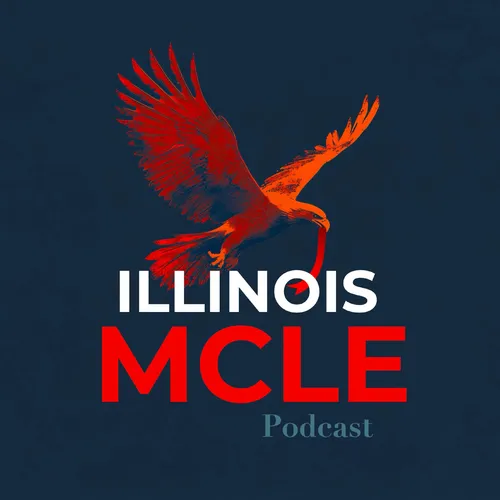
Illinois MCLE Podcast
The Illinois MCLE Podcast by TalksOnLaw is a series of enjoyable interviews with leading law professors, practitioners, and judges. Topics from police power, to technology and privacy, to the ownership of DNA. All subscribers can enjoy our interview series with the titans of law. MCLE credit for this series is available only to our TalksOnLaw premium or TalksOnLaw podcast member. Visit www.talksonlaw.com to learn more and join. Courses are accredited on the date published. However, visit www.TalksOnLaw.com/podcast to confirm whether older courses remain active for MCLE reporting purposes.
- Update frequency
- every 7 days
- Average duration
- 43 minutes
- Episodes
- 54
- Years Active
- 2022 - 2025

Combatting Crypto Money Laundering
Cryptocurrency and crypto assets are increasingly deployed to launder illicit funds for use in the legitimate financial system. Alex Zerden, a former Treasury Department official at The Financial Cri…

A Transition in Law (Part 2)
For many years, Dru Levasseur fought for LGBTQ+ rights in courts across the nation. Now, he works to improve the experience of LGBTQ+ attorneys in the legal profession. In this conversation, Dru shar…

A Transition in Law
For many years, Dru Levasseur fought for LGBTQ+ rights in courts across the nation. Now, he works to improve the experience of LGBTQ+ attorneys in the legal profession. In this conversation, Dru shar…

Human Information Privacy (Part 2)
As troves of personal data are collected, stored, and used by governments and private companies in today’s digital age, privacy is becoming an increasing concern. Privacy is essentially about setting…

Human Information Privacy
As troves of personal data are collected, stored, and used by governments and private companies in today’s digital age, privacy is becoming an increasing concern. Privacy is essentially about setting…

The Ethical Limits of Negotiations (Part 2)
In negotiations, can lawyers lie to their advantage? Can lawyers ethically use bullying or threatening to benefit clients? Professor Carrie Menkel-Meadow of UC Irvine Law explores the boundaries of e…

The Ethical Limits of Negotiations
In negotiations, can lawyers lie to their advantage? Can lawyers ethically use bullying or threatening to benefit clients? Professor Carrie Menkel-Meadow of UC Irvine Law explores the boundaries of e…

Mind Police–Memory Evidence (Part 2)
In 2008, a woman in India was convicted of murder for the death of her fiancé on the basis of evidence derived from a brain-based memory detection exam. The test measured brain activity which purport…

Mind Police–Memory Evidence in the Courts
In 2008, a woman in India was convicted of murder for the death of her fiancé on the basis of evidence derived from a brain-based memory detection exam. The test measured brain activity which purport…

Prof. Joy on Batson
The United States has a long history of racial discrimination in juries. In 1875, Congress passed the Civil Rights Act which prohibited race-based discrimination in jury service. Yet, states continue…

Investigating the Client
When does a lawyer have a duty to investigate her own clients? If a lawyer suspects, but does not know, that a client or potential client is seeking their services to engage in criminal activity, can…

Dobbs v. Jackson, a Battleground for Abortion Rights
This term, the Supreme Court is set to decide the most important abortion rights case in decades, Dobbs v. Jackson Women’s Health Organization. The Supreme Court will assess the constitutionality of …

Policing the Police (Part 2)
In part 2 of this 2-part series, Professor Harmon explains the constitutional right to record the police and under what circumstances that right may be limited, and explores the potential federal ref…

Policing the Police
Police officers have broad authority and discretion to enforce order — they can take property, stop, detain, and arrest people — at times under threat of lethal force. With such great power comes a s…